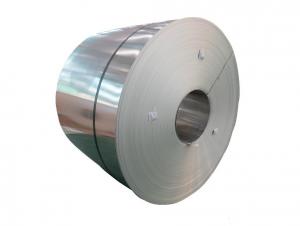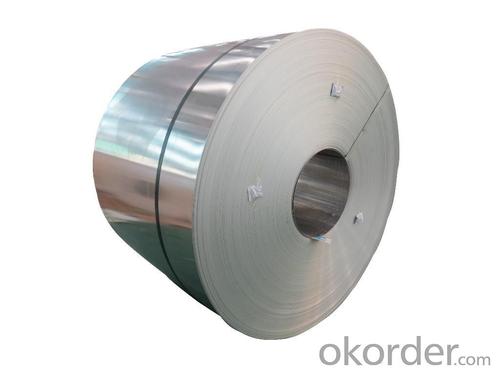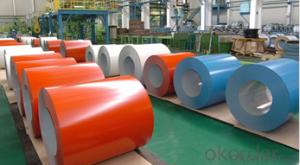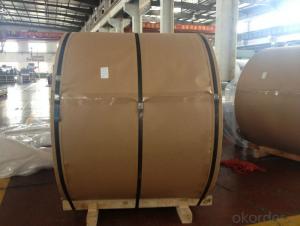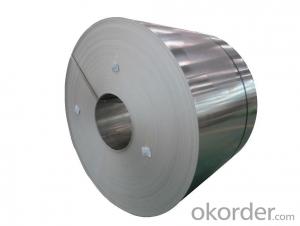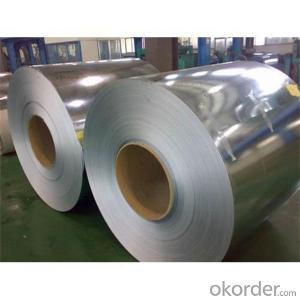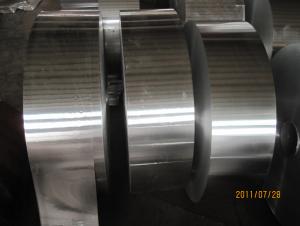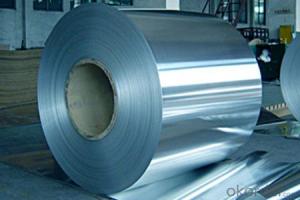Flat Aluminum Coil - Hot Rolled Aluminium Strip in Coils AA1050-F
- Loading Port:
- China Main Port
- Payment Terms:
- TT or LC
- Min Order Qty:
- -
- Supply Capability:
- -
OKorder Service Pledge
OKorder Financial Service
You Might Also Like
1.Structure of Product Description
2. Main features of the product
a.Competitive price---We have our own aluminium mills, and we can provide competitive price than other small suppliers.
b.Professional after-sale service---We have more than 20 years exportation experience. So you do not worry about the after-sales service.
3. Image 4. Product Specification
c.Fast delivery time---Our usual delivery time is about 30 days.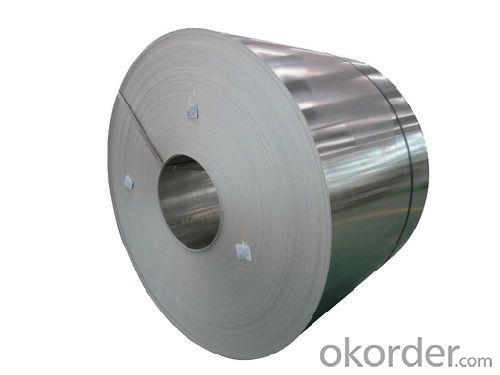
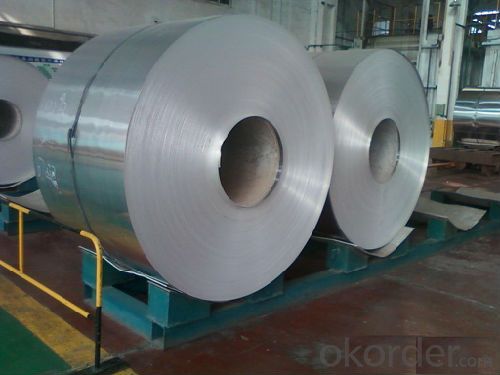
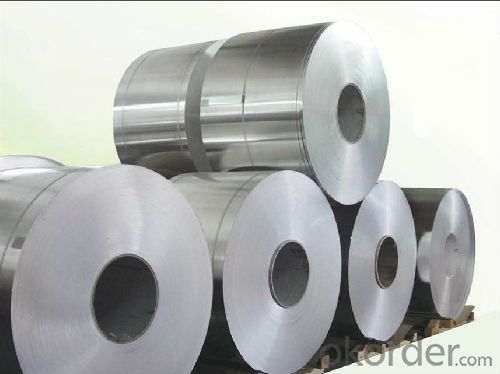
Alloy Temper Thickness Coil ID Coil Weight AA1050 F 3-8mm 610mm Min 5 tons
5.FAQ:
What is the quality standard?
---Usually our standard is GB3880-2006
What is the largest width?
---It is 2300mm
What is the MOQ?
---Usually we can accept 80 tons.
- Q: What are the different edge treatments available for aluminum coils?
- Some of the different edge treatments available for aluminum coils include mill finish, edge trim, deburred edge, rounded edge, and hemmed edge.
- Q: Can aluminum coils be used in cryogenic applications?
- Indeed, cryogenic applications can utilize aluminum coils. Highly regarded for its remarkable thermal conductivity, aluminum proves to be an appropriate substance for heat transfer in environments with low temperatures. Moreover, aluminum exhibits a minimal coefficient of thermal expansion, enabling it to endure the drastic temperature fluctuations inherent in cryogenic applications while avoiding notable alterations in dimensions. Nevertheless, it is important to acknowledge that aluminum coils might necessitate specific design or treatment to guarantee their resilience against exceedingly frigid temperatures and mitigate any potential concerns like brittleness or embrittlement.
- Q: What are the different coil coating technologies used for aluminum coils?
- Aluminum coils can be coated using various technologies, each with its own advantages and suitability for specific applications. The first method involves applying liquid coatings onto the aluminum coils. These coatings can be solvent-based or water-based and are typically applied using roll coating or spray coating techniques. Liquid coatings provide a wide range of color options, excellent chemical resistance, and good adhesion to the substrate. However, they may take longer to dry and result in uneven coating thicknesses. Another method is using powder coatings, which are electrostatically applied as a dry powder onto the aluminum coils. The coated coils are then heated to melt and cure the powder, creating a tough and durable finish. Powder coatings offer excellent corrosion resistance, UV resistance, and impact resistance. They also have a high deposition efficiency, resulting in minimal waste. However, compared to liquid coatings, they may have limited color options. PVDF coatings are a type of liquid coating known for their exceptional weatherability and durability. They are resistant to fading, chalking, and chemical exposure, making them suitable for architectural applications requiring long-term performance and color retention. PVDF coatings can be applied using roll coating or spray coating methods. Polyester coatings are widely used in various industries due to their cost-effectiveness and versatility. They offer good color retention, flexibility, and resistance to abrasion. Available in a wide range of colors and textures, polyester coatings are suitable for decorative applications. They can be applied using both liquid and powder coating methods. Polyurethane coatings provide excellent adhesion, flexibility, and impact resistance. They are commonly used in demanding applications that require durability and resistance to harsh environments. Polyurethane coatings offer good color retention and can be applied using liquid coating techniques. In conclusion, there are several different coil coating technologies available for aluminum coils, including liquid coatings, powder coatings, PVDF coatings, polyester coatings, and polyurethane coatings. The choice of coating technology depends on factors such as desired performance characteristics, application requirements, and cost considerations.
- Q: How are aluminum coils tested for surface cleanliness?
- To ensure that aluminum coils meet the required standards, various methods and techniques are employed to test their surface cleanliness. One commonly used method is the water break test, where a clean water droplet is placed on the coil's surface. If the water spreads out evenly and forms a continuous film without beading or breaking, it indicates that the surface is clean and devoid of any contaminants. Another approach involves the solvent wipe test, where a wipe soaked in solvent is gently rubbed on the coil's surface. The wipe is then examined for any dirt or residue, indicating the presence of contaminants on the surface. Furthermore, surface energy measurement is carried out to assess the cleanliness of aluminum coils. This entails using a contact angle measurement device to measure the coil's surface energy. A high surface energy suggests a clean surface, while a low surface energy indicates the presence of contaminants. Moreover, visual inspection is commonly employed to detect any visible dirt, oil, or other foreign substances on the coil's surface. This can be done using a magnifying glass or under specific lighting conditions to ensure a thorough examination. In conclusion, a combination of these methods is utilized to evaluate the cleanliness of aluminum coils, ensuring that they are free from contaminants and suitable for further processing or use in various industries.
- Q: Are aluminum coils resistant to UV radiation?
- Generally, aluminum coils have resistance to UV radiation. Aluminum is a material known for its high durability and resistance to corrosion. It possesses innate properties that shield it from the harmful impacts of UV radiation. Unlike some other metals, aluminum does not undergo oxidation or deterioration when exposed to sunlight over long durations. This characteristic renders it an excellent option for applications that involve UV exposure, including outdoor structures, solar panels, and automotive components. Nonetheless, it is crucial to acknowledge that although aluminum can withstand UV radiation, it may still experience degradation if not adequately protected or maintained.
- Q: Are there any specific regulations for the transportation of aluminum coils?
- Yes, there are specific regulations for the transportation of aluminum coils. These regulations typically include guidelines for securing the coils properly to prevent shifting or damage during transit. Additionally, there may be requirements for labeling, documentation, and handling procedures to ensure the safe transportation of aluminum coils.
- Q: Can aluminum coils be used in the manufacturing of electronic devices?
- Yes, aluminum coils can be used in the manufacturing of electronic devices. Aluminum has excellent electrical conductivity and thermal properties, making it suitable for various applications in electronics, such as in transformers, inductors, and heat sinks. Its lightweight nature and corrosion resistance also make it a popular choice for electronic components.
- Q: Can aluminum coils be used in power generation facilities?
- Yes, aluminum coils can be used in power generation facilities. Aluminum has excellent thermal conductivity, making it an efficient choice for heat transfer applications in power generation equipment such as heat exchangers and condensers. Additionally, aluminum's lightweight nature and corrosion resistance make it a viable option for various power generation processes, including wind turbines and hydroelectric power plants.
- Q: What are the weight ranges of aluminum coils?
- The size and thickness of aluminum coils determine their weight ranges, which can vary greatly. Aluminum coils can weigh anywhere from a few hundred pounds to several thousand pounds. Coils used for household purposes or in manufacturing small parts usually weigh around 100-500 pounds. Coils commonly used in construction or automotive industries range from 500-2,000 pounds. On the other hand, larger coils utilized in heavy-duty applications like aerospace or marine industries can exceed 2,000 pounds and sometimes even surpass 10,000 pounds. It is important to emphasize that these weight ranges are approximate and can differ based on the specific requirements of a particular project or application.
- Q: Can aluminum coils be used for solar panel applications?
- Yes, aluminum coils can be used for solar panel applications. They are often utilized as the base material for solar panels due to their lightweight, corrosion-resistant, and durable properties. Additionally, aluminum coils offer good thermal conductivity, enabling efficient heat dissipation in solar panels.
Send your message to us
Flat Aluminum Coil - Hot Rolled Aluminium Strip in Coils AA1050-F
- Loading Port:
- China Main Port
- Payment Terms:
- TT or LC
- Min Order Qty:
- -
- Supply Capability:
- -
OKorder Service Pledge
OKorder Financial Service
Similar products
Hot products
Hot Searches
Related keywords
